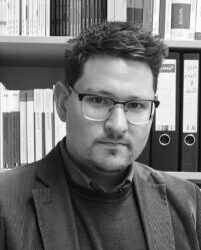In November last year, we reported on the DIID teaching project “Ethical Issues in Artificial Intelligence (AI)“, which was funded by the Citizens’ University. The project was successfully concluded last week with three workshops held at a Düsseldorf secondary school.
AI is increasingly shaping public discourse and is now being used in almost all areas of society (e.g. medicine, law, advertising, lending, insurance, art and culture). Looking to the future, there is even talk of a revolution insofar as it is assumed that AI will fundamentally change our societies. Whether these changes will be equally beneficial for all people also depends on successful ethical reflection. This reflection was the aim of the teaching project led by DIID members Jonathan Seim and Jonas Carstens, in which HHU students dealt with ethical issues relating to artificial intelligence and developed corresponding workshop concepts for pupils.
The teaching project, which has now been completed, fulfilled its reflective mission in two respects by encouraging both students and pupils to engage in a critical discussion about ethical issues surrounding AI. One participating student said: “I think that the topic is becoming more and more important and is taking up an ever larger part of society, so I felt a responsibility to educate myself on the topic of AI.” The students were educated in the four key topics: Discrimination, Influencing Behaviour, Responsibility/Transparency and Educational Institutions. With the basics they had learnt, they started the second part of the teaching project, in which the development of the workshop concepts began. The students worked in teams to create concepts that would enable the pupils to critically examine the risks and opportunities of the technologies, as well as to take a self-determined approach and participate in the democratic discourse in an informed manner. The final week of the teaching project was the practical realisation of these workshop concepts at Annette-von-Droste-Hülshoff secondary school in Düsseldorf. Two eleventh-grade classes took part, divided into three workshops on the topics of AI and discrimination, AI and responsibility/transparency and AI in educational institutions. The feedback from the students and pupils was very positive and one of the teachers responsible for the classes promptly invited the students to visit the school again next year. The initiators Jonathan Seim and Jonas Carstens also draw a positive conclusion and are pleased with the positive feedback.
In the context of the DIID’s task profile, the project made an important contribution to the transfer of scientific knowledge to society. In view of the success of this one-off teaching project, we are now examining whether it is possible to continue the workshop programme at DIID. We will be sure to keep you up to date on this!
Ansprechpartner
Dr. Dennis Frieß (Coordinator)
Board, Communication Studies, DIID-Team

Dr. Dennis Frieß is coordinator of the DIID. Since May 2019, he was coordinator of the NRW Research College Online Participation. From 2014 to 2019, he was a research assistant at the Chair of Communication and Media Studies III at HHU-Düsseldorf and a staff member at DIID. He studied Social Sciences, Law and Communication Science at the University of Erfurt (B.A.) and Political Communication in Düsseldorf (M.A.). His doctoral thesis focused on the analysis of deliberative online publics. His research focuses on political (online) communication, online deliberation, and online participation.
At the DIID, he is particularly interested in online-supported deliberation processes and the democracy-relevant expectations associated with online participation offerings.


